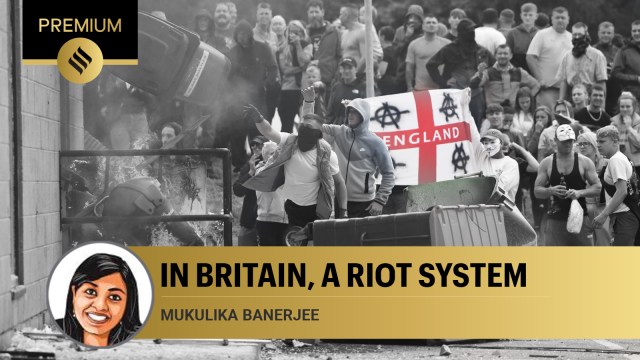
The riots across the UK were seemingly triggered by an act of random violence in the town of Southport (near Liverpool), where a 17-year-old man was arrested and charged with stabbing to death three little girls and seriously injuring several others. The children were spending the morning at a summer holiday dance camp learning the routines of pop star Taylor Swift, who recently concluded a hugely successful tour of Britain.
It soon became public that the arrested man lived locally and had been born in the UK, of Rwandan parents. The police made it known early on that they did not think it was a terrorist act, and that mental health issues seemed more likely.
This was an awful incident that should be understood primarily as symptomatic of a global trend of rising violent crime by males against females (and secondarily, perhaps, as reflecting the growing mental health care issues in the UK, though whether that was a relevant aspect will be clarified in due course by the trial). However, the heinous crime was swiftly weaponised by far-right groups in support of their anti-immigrant and anti-Muslim agenda, despite Rwanda not being a Muslim country.
Fake news was soon pumped out, falsely identifying the arrested man as a Muslim, along with videos — made using AI — showing “Muslim men” wielding knives and shouting “anti-British” slogans. Following these social media activities (and as always there is a strong possibility of the involvement of other states with an interest in destabilising democracies), there were “protests” outside of, and attacks upon, mosques, Muslim-owned businesses, and hotels believed by the mobs to be housing asylum seekers. Windows were smashed, fires started, cars overturned, and police injured.
A judge waived the usual anonymity of an under-18 charged with a serious crime in order to make clear that the arrested man was not a Muslim. However, violence continued to spread across over a dozen cities, including London and Leicester, as groups with names like “English Defence League”, “Britain First” and “Patriotic Alternative” have run riot and clashed with anti-racism groups who have mobilised in response. This disorder recalls the race riots of the 1970s and 1980s when Indians, Pakistanis and those from the Caribbean were frequently attacked and abuse was commonplace.
Why has it erupted again now? In part, it seems a deliberate challenge to the new peacefully-elected Labour government.
Insights from the study of communal riots in India are helpful. In 2004, Paul Brass outlined what he called the “institutionalised riot system” to explain Hindu-Muslim riots in India. A “riot system” is an interconnected network of the media, criminal groups, the local political and administrative leadership, and police, that whips up communal divides for political gain, directly fuelling and exploiting riots and bloodshed. Brass identified three specific phases of a riot: Preparation, activation and explanation.
Turning to Britain, the first phase of “preparation” started in 2001 when Islamophobia was legitimised globally in a post-9/11 world. The past 14 years under Conservative rule have seen officially endorsed right-wing activism fuel the move to Brexit and induce anti-immigration sentiment and growing “culture wars” in which any historically informed arguments (by the beloved National Trust, for example) exploring Britain’s colonial record, or the vital role of precarious immigrant workers in cutting costs and fuelling capitalist growth were dismissed as “woke”.
These years also saw the deliberate erosion of the “resilience” of the British state and society through an ideological cult of austerity, which systematically underfunded the police, courts and prisons, and left the system of law and order — and health services — teetering on the edge of collapse. The border force and immigration services faced their own cuts causing huge delays in processing applications and thus the need to house ever more applicants for ever longer. Rishi Sunak dealt with these challenges by housing them in expensive temporary accommodation in hotels, funded by taxpayers. Others were proposed to be flown to Rwanda to be held in centres there, again at huge cost to the UK taxpayer. All this while most Britons have experienced cost of living challenges from rising food, fuel and housing costs, and living standards that have been stagnant since 2010.
The past week in Britain was the second or “activation” phase of the institutionalised riot system. Right-wing leaders and activists sought to harness wider frustrations and anger built up through those years of Conservative extremism and incompetence and send it out onto the streets through violence. The recent electoral success of Reform UK and its leader Nigel Farage, who was finally elected an MP after eight failed attempts, emboldened their efforts further. Farage was quick to support some of the conspiracy theories circulating on social media.
In Brass’s typology, the third phase of “explanation” or interpretation involves controlling the narrative of how and why these riots occurred, including avoiding any blame being assigned to the political groups responsible. This is usually the case when the government is ideologically in sync with the rioters. Thankfully, however, in Britain, this is not the case. The Labour Prime Minister Keir Starmer, his Home Secretary, and cabinet have been unequivocal in criminalising the violence, calling it “far right thuggery”, not protest, and promising hundreds of arrests and prosecutions: “This violent mob does not represent our country and we will bring them to justice,” Starmer said. Around 250 arrests have already been made. Civil society groups such as Hope Not Hate have been tackling anti-immigrant violence for years and local community groups have come together to rebuild damaged mosques and provide protection to immigrants.
The famous British slogan of Keep Calm and Carry On is being repurposed, perhaps inspired by Taylor Swift’s anti-prejudice and anti-hate anthems, “You Need to Calm Down” and “Shake it Off”.
The writer is Professor of Anthropology, LSE and author of Cultivating Democracy